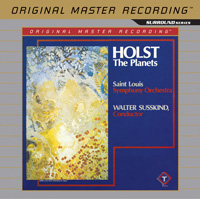
2. VENUS, The Bringer of Peace 7:40
3. MERCURY, the Winged Messenger 4:04
4. JUPITER, The Bringer of Jollity 7:47
5. SATURN, The Bringer of Old Age 9:18
6. URANUS, The Magician 5:47
7. NEPTUNE, The Mystic 7:32
Gustav Holst (1874 – 1934) did not expect the popularity his 7-movement Planets would exceed that of his other more personal and philosophical works, like St. Paul’s Suite, The Perfect Fool, Hymn of Jesus, etc. In fact, he was alarmed and frightened by the prospect. Although none of his other works would proclaim his genius in melodic innovation and orchestration more radiantly, Holst did not consider the Planets a reflection of his inner world.
His primary interest was in categorizing English folk songs, a lifelong, personal enthusiasm the Planets nearly succeeded in concealing, were it not for the catching and refreshing violin solo in “Venus, The Bringer of Peace”, and likewise in “Mercury, The Winged Messenger”. Perhaps it was due to the fact that Hollywood has so successfully borrowed the other more magnificent passages of this Symphony Suite so numerously, that I should find “Mercury” sounding particularly English among other movements.
Quite a few major conductors have had something to say about Gustav Holst’s (1874 -1934) The Planets Suite, and the kindred spirits contributed tremendously to posterity.
Established classical labels, such as Deutsche Grammophon, EMI and Decca, were not the only ones presenting the musical treasures on the world scene. Telarc, the highly regarded audiophile label, also had the foresight of releasing two Planets: one with Andre Previn and Royal Philharmonic Orchestra in 1986 (Telarc CD-80133), another with Yoel Levi & Atlanta Symphony Orchestra in 1997 (CD-80466). Both discs are well received among audiophiles and the laymen alike, with enormous dynamics and velvety smoothness to boast. Readers with sonics in mind in the years before the Millennium could go no further than these two discs.
On the other hand, John Eliot Gardiner’s 1995 DG reading with Philharmonia Orchestra and Women’s Voices of the Monteverdi Choir (DG G2-45860) was among the most authoritative since Charles Dutoit’s 1987 Decca disc with L’Orchestre Symphonique de Montreal (Decca 417 553-2), which was in turn preceded by another DG disc: the standard-setting 439 011-2, a 1981 original by Herbert von Karajan and the Berlin Philharmonic, now remastered in the “Karajan Gold” edition in the proprietary “Original-Image Bit-Processing” technology. But ever since DG remastered Gardiner’s milestone and released it in multi-channel SACD in 2003, many critical listeners have regarded it as the sole option in the New Millennium.
Until today.
Mobile Fidelity Sound Lab’s latest Holst The Planets hybrid SACD is the label’s latest incursion into the SACD classical world, offering classical fans with one more hi-rez alternative with Walter Susskind conducting the Saint Louis Symphony Orchestra.
Mastered with MoFi’s proprietary GAIN 2™ (Greater Ambience Information Network) System and pressed with the Ultradisc UHR™ technology, this DSD-refined hybrid SACD offers some of the most pristine Redbook CD sound as sourced from a 1970’s analog original. In this day and age, producing vanilla CD’s is unthinkable with the advent of such advanced mastering and pressing technologies, as in JVC’s XRCD24, Sony’s DSD and MoFi’s GAIN 2™ . In the case of MoFi, the combined excellence of a DSD-processed master furthered refined by GAIN 2™ makes the Planets glowingly hot, not to mentioned the resultant content being carried by a Ultradisc UHRtm medium.
At the helm of the mastering was Paul Stubblebine from Stubblebine Studio in San Francisco, who also mastered the Seattle label, First Impression Music’s award-winning audiophile productions.
While the performance of the Saint Louis Symphony Orchestra’s brasses in this recording are adequate and quite spectacular, the group’s strings and woodwinds are heavenly, their concordant, majestic unity in “Venus” and “Mercury” is utterly evocative and imaginative, and most certainly out of this world. Also most adorable is the choral contribution of the Ronald Arnatt Chorale and Missouri Singers in “Neptune, The Mystic”, whose resonating, whispery singing goes beyond the mystified one to the most outer realm for this listener. And this track has the advantage of being the last track, bidding farewell to the listener with a mark impossible to be oblivious to.
The Susskind/Saint Louis’ “Saturn, The Bringer of Old Age”, , has the seldom heard gracefulness right from the beginning, which the maestro so masterfully compels and inspires the members of the Saint Louis Symphony Orchestra to sustain. Soon as the bell tolls near the finalizing moment, promise of restfulness is deeply assuring. So this is what old age really ought to feel like.
Susskind’s handling of the festive possession of “Uranus, The Magician”, is of such contagious theatrical effects, he invokes the silver screen excitement while managing never to stray from its classical core into excessive and mediocre flamboyancy. And although the Susskind Magician is not as authoritative and awe-inspiring as some of his European colleagues’, his has a charisma that keeps the mesmerized listener feeling assured, promised and safe.
Retrospectively, Susskind’s “Mars, The Bringer of War”, did not impart the most favorable of impression upon first listening; but the track is also in the perhaps disadvantaged position of being the first one listeners will encounter. So it was only after experiencing the rest of the CD did I return suspiciously to the beginning and found it to be truly more unique than disagreeing, as I found the Saint Louis’ broad strokes under Susskind’s baton ultimately agreeable and entertaining.
Although Susskind’s direction on top of a few musicians’ occasional, highly personal manifestations lend an appreciable dosage of dramatic flare in Susskind’s Planets, it is the orchestra’s general informality that creates a most original impression, as if Holst custom-fitted Planets for Susskind and his SLSO. For anyone who are suffering from preconception as a result of ownership of too many other Planets, this MoFi hybrid SACD may shed off the ever often dogmatism for the listener from this frequently recorded work that have inundated the music world.
- (Page 1 of 1)
